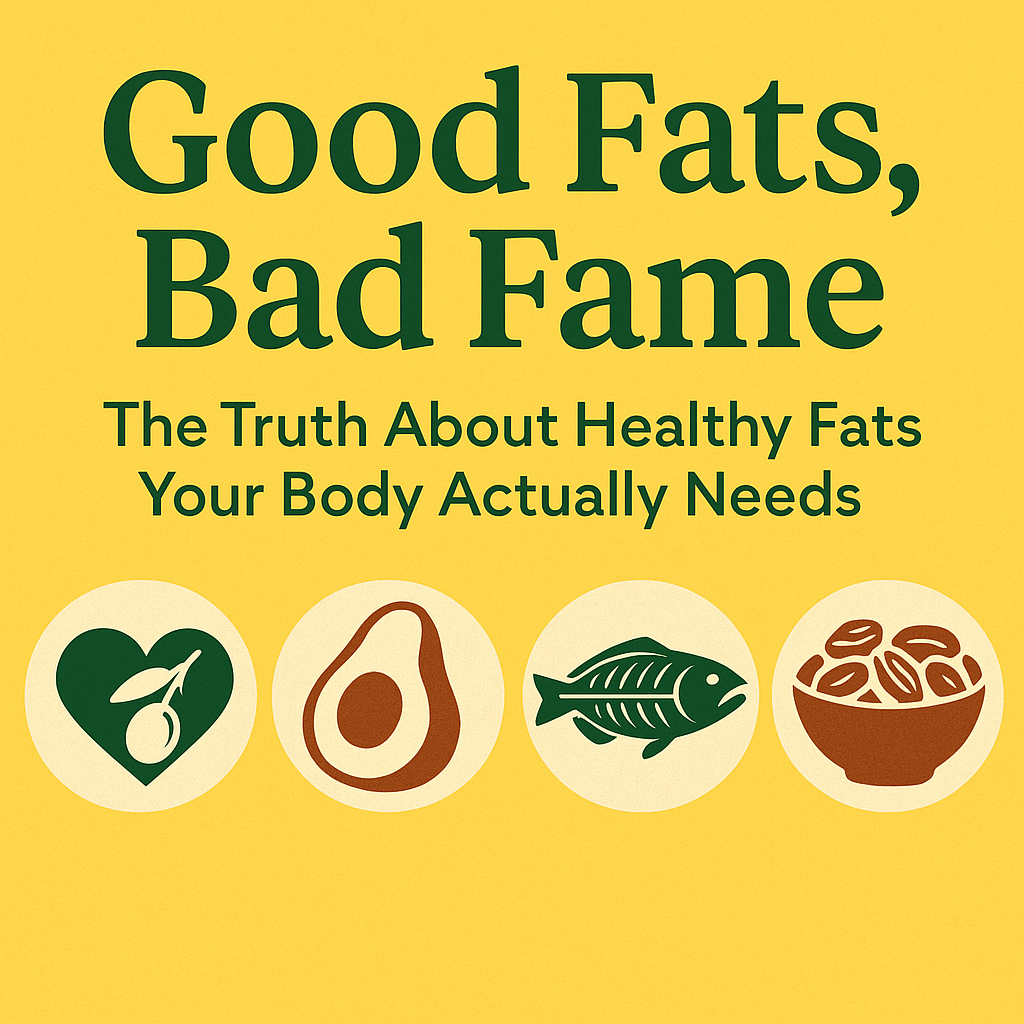🥑 Introduction:
For decades, dietary fat was the villain of nutrition. Grocery store shelves were lined with “fat-free” snacks, margarine replaced butter, and we were warned that fat made us fat. But science tells a different story now—one that clears the name of many misunderstood fats and repositions them as essential allies in your health journey. The key isn’t avoiding all fats—it’s knowing which fats to embrace and which to leave behind.
Let’s break down the different types of fats, why they matter, where to find them, and how they affect everything from heart health to brain function.
🧠 The Two “Good Fats”: Monounsaturated & Polyunsaturated
🥜 1. Monounsaturated Fats (MUFAs)
Monounsaturated fats are considered one of the healthiest forms of dietary fat. They help reduce bad LDL cholesterol while maintaining good HDL cholesterol, lowering your risk of heart disease.
Where you find them:
-
Extra virgin olive oil
-
Avocados
-
Almonds, peanuts, cashews
-
Peanut butter (natural, unsweetened)
-
Sesame oil
Benefits:
-
Improved heart health
-
Better blood sugar control
-
Supports weight management by promoting satiety
-
Reduces inflammation
Pro tip: Use olive oil for salad dressings or sautéing, and snack on raw almonds instead of chips.
🐟 2. Polyunsaturated Fats (PUFAs)
Polyunsaturated fats include two powerful subtypes: omega-3 and omega-6 fatty acids. These are essential fats, meaning your body can’t make them on its own—you must get them from food.
🧬 Omega-3 Fatty Acids: The Brain’s Best Friend
Omega-3s are anti-inflammatory powerhouses. They play a vital role in brain function, fetal development during pregnancy, and reducing the risk of heart disease and autoimmune disorders.
Best sources of omega-3s:
-
Fatty fish (salmon, sardines, mackerel, trout)
-
Walnuts
-
Chia seeds
-
Flaxseeds
-
Algae oil (for plant-based diets)
Key benefits:
-
Reduces risk of stroke and heart disease
-
Improves cognitive performance
-
Supports emotional health and reduces depression risk
-
Promotes healthy pregnancy and infant development
🧠 Quick Fact: DHA (a type of omega-3) makes up about 40% of the polyunsaturated fatty acids in your brain—and that’s why omega-3s are critical for mental clarity and memory.
🌽 Omega-6 Fatty Acids: The Controversial Cousin
Omega-6s are also essential fats and can help lower cholesterol and support skin health. But they come with a warning: imbalanced intake can lead to chronic inflammation.
Common omega-6 sources:
-
Vegetable oils (corn, sunflower, soybean, safflower)
-
Processed snacks and fast foods
-
Margarine
Why they’re tricky:
Most modern diets are extremely high in omega-6 and low in omega-3, sometimes at ratios as high as 20:1. Ideally, this ratio should be closer to 4:1 or 1:1 to avoid inflammatory diseases.
Solution: Increase omega-3 intake and reduce reliance on heavily processed vegetable oils.
☠️ Fats to Avoid Completely: Trans Fats
Trans fats are man-made fats created by hydrogenating oils to make them solid at room temperature. These fats raise bad cholesterol, lower good cholesterol, and cause systemic inflammation.
Found in:
-
Commercial baked goods (cookies, cakes, donuts)
-
Packaged snacks (crackers, microwave popcorn)
-
Fried foods
-
Shortening and margarine
Even small amounts of trans fats increase your risk of heart disease and stroke. The World Health Organization has called for global elimination of trans fats from the food supply.
❌ Rule of thumb: If you see “partially hydrogenated oil” on the label, put it back.
🧈 What About Saturated Fat?
Saturated fat lives in a gray area. Found in foods like butter, cheese, red meat, and coconut oil, its impact on heart health is still debated.
Current recommendations:
-
Limit saturated fats to less than 10% of total daily calories
-
Focus on replacing them with unsaturated fats rather than refined carbs or sugar
Moderate intake of high-quality sources (like grass-fed butter or organic coconut oil) may be fine for some people—but balance is key.
🍽️ How to Build a Fat-Smart Diet
Tips to optimize healthy fat intake:
✅ Cook with extra virgin olive oil
✅ Eat fatty fish twice a week
✅ Snack on mixed nuts and seeds
✅ Use avocado in salads, wraps, or smoothies
✅ Avoid processed junk foods high in trans fats
✅ Read ingredient labels carefully
💬 Common Myths About Fat (Busted)
❌ “Fat makes you fat”
➡️ Truth: Excess calories make you fat. Healthy fats keep you full longer and can support weight loss.
❌ “Low-fat = healthy”
➡️ Truth: Many low-fat products are loaded with sugar and starch to compensate for flavor.
❌ “All saturated fats are evil”
➡️ Truth: Context matters. Whole foods like full-fat yogurt or coconut oil aren’t the same as processed junk.
❤️ Why It Matters:
Fats are more than just energy sources—they’re building blocks of life. Your brain, heart, hormones, skin, and even your immune system depend on fats to function optimally. Ditching fat altogether isn’t just outdated—it’s dangerous.
By choosing healthy fats and avoiding the harmful ones, you’re not just eating smarter—you’re reprogramming your body for vitality, resilience, and longevity.

